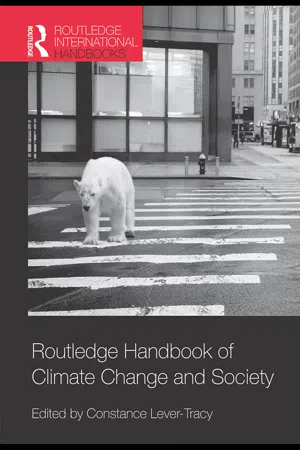
Routledge Handbook of Climate Change and Society
- 482 pages
- English
- ePUB (mobile friendly)
- Available on iOS & Android
Routledge Handbook of Climate Change and Society
About this book
As the time-scales of natural change accelerate and converge with those of society, Routledge Handbook of Climate Change and Society takes the reader into largely uncharted territory in its exploration of anthropogenic climate change. Current material is used to highlight the global impact of this issue, and the necessity for multidisciplinary and global social science research and teaching to address the problem.
The book is multidisciplinary and worldwide in scope, with contributors spanning specialisms including agro-forestry, economics, environmentalism, ethics, human geography, international relations, law, politics, psychology, sociology and theology. Their global knowledge is reflected in the content of the text, which encompasses chapters on American, European and Chinese policies, case studies of responses to disasters and of the new technological and lifestyle alternatives that are being adopted, and the negotiations leading up to the Copenhagen conference alongside a preface assessing its outcomes. Starting with an initial analysis by a leading climatologist, key issues discussed in the text include recent findings of natural scientists, social causation and vulnerability, media and public recognition or scepticism, and the merits and difficulties of actions seeking to mitigate and adapt.
This accessible volume utilizes a wealth of case studies, explains technical terms and minimises the use of acronyms associated with the subject, making it an essential text for advanced undergraduates, postgraduate students and researchers in the social sciences.
Frequently asked questions
- Essential is ideal for learners and professionals who enjoy exploring a wide range of subjects. Access the Essential Library with 800,000+ trusted titles and best-sellers across business, personal growth, and the humanities. Includes unlimited reading time and Standard Read Aloud voice.
- Complete: Perfect for advanced learners and researchers needing full, unrestricted access. Unlock 1.4M+ books across hundreds of subjects, including academic and specialized titles. The Complete Plan also includes advanced features like Premium Read Aloud and Research Assistant.
Please note we cannot support devices running on iOS 13 and Android 7 or earlier. Learn more about using the app.
Information
Part 1 Understanding climate change
1 The science of climate change: knowledge, uncertainty and risk1
Today, global climate change is a fact. The climate has changed visibly, tangibly, measurably. An additional increase in average temperatures is not only possible, but very probable, while human intervention in the natural climate system plays an important, if not decisive role.Bruno Porro, Chief risk officer, Swiss Reinsurance (2002)
Climate change is a major concern in relation to the minerals sector and sustainable development. It is, potentially, one of the greatest of all threats to the environment, to biodiversity and ultimately to our quality of life.Facing the Future, Mining Minerals and Sustainable Development Australia (2002)
We, the human species, are confronting a planetary emergency – a threat to the survival of our civilization that is gathering ominous and destructive potential even as we gather here. But there is hopeful news as well: we have the ability to solve this crisis and avoid the worst – though not all – of its consequences, if we act boldly, decisively and quickly.Al Gore, Nobel Peace Prize Lecture (2007)
Introduction
Recent global warming

Table of contents
- Cover Page
- Table Of Contents
- Routledge Handbook of Climate Change and Society
- Routledge Handbook of Climate Change and Society
- Part I Understanding climate change
- 1 The science of climate change: knowledge, uncertainty and risk
- 2 Climate change: complexity and collaboration between the sciences
- Part II Social impacts on Nature
- 3 Organisations and global warming
- 4 Capitalism versus Nature: eco-socialist approaches to the climate crisis
- 5 Ecological economics: the impact of unsustainable growth
- 6 Ecological economics: consumption drivers and impacts
- Part III Natural impacts on society
- 7 Vulnerability and adaptation to climate change
- 8 Ecological rationality, disaster, and the environmental education of leaders
- 9 Case study: floods in Mumbai
- Part IV Social recognition of climate change
- 10 Public opinion: a cross-national view
- 11 Media presentations of climate change
- 12 Case study: climate change reporting in Time magazine
- 13 Religion, worldview and climate change
- 14 Climate change denial: sources, actors and strategies
- Part V Reducing emissions
- 15 Crises and opportunities
- 16 Alternative scenarios: varieties of capitalism
- 17 Alternative scenarios: technological optimism or low energy futures
- 18 Bio-fuels
- 19 The nuclear option
- 20 Case study: agro-forestry in the Philippines
- 21 Public opposition to renewable energy
- 22 Behavioural insights: motivating individual emissions cuts through communication
- Part VI National and global policies
- 23 Climate change and energy security in the European Union: from rhetoric to practice?
- 24 Case study: wind energy regulation in Germany and the UK
- 25 Tipping point: crossroads for US climate policy
- 26 China’s emissions: dangers and responses
- 27 Justice and the politics of climate change
- 28 International law responses to climate change
- 29 Pushing past neo-liberalism: rethinking global climate change negotiations